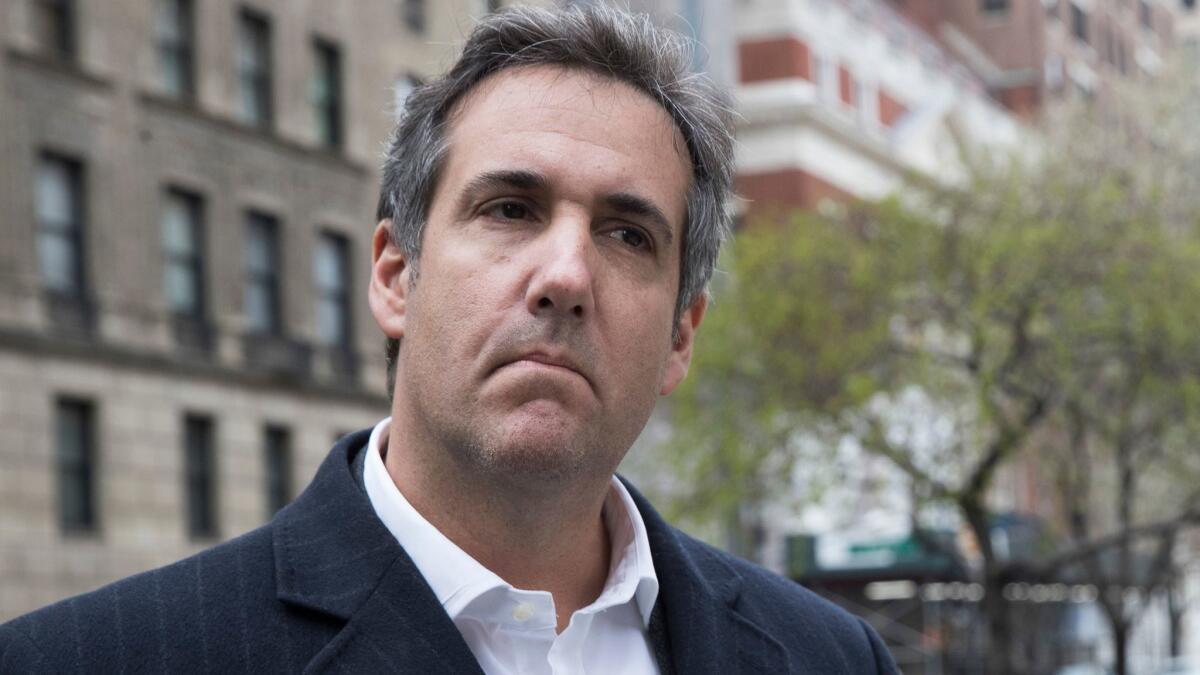AT&T calls hiring Michael Cohen ‘big mistake’ and says its public policy chief will retire

- Share via
Hoping to quell a growing controversy, AT&T Inc. chief Randall Stephenson said Friday that the phone giant did not break any laws but committed a “serious misjudgment” in hiring Michael Cohen, President Trump’s personal attorney and fixer, as a political consultant.
“Our company has been in the headlines for all the wrong reasons these last few days and our reputation has been damaged,” Stephenson, the company’s chairman and chief executive, said in a memo to employees Friday morning. “There is no other way to say it — AT&T hiring Michael Cohen as a political consultant was a big mistake.”
Stephenson also announced that a high-level executive in its Washington, D.C., office, Bob Quinn, is retiring in the wake of the controversy. Since October 2016, Quinn has been in charge of AT&T’s public policy group. Before that, he was responsible for coordinating the company’s dealings with federal regulators.
AT&T hired Cohen in 2017 for strategic advice, paying him $50,000 a month — a total of $600,000 — in hopes of helping smooth the way for the federal government’s approval of AT&T’s proposed $85-billion takeover of Time Warner Inc.
In a statement Friday, AT&T said that Cohen approached it after the 2016 presidential election and said he was leaving the Trump Organization and would do consulting “for a select few companies that wanted his opinion on the new President and his administration — the key players, their priorities, and how they think.”
AT&T also acknowledged that the office of special counsel Robert Mueller — which is investigating Russia’s interference in the presidential election — contacted it late last year about its involvement with Cohen. The telecom giant said Friday that it cooperated, providing information last November and December. Since then, AT&T said, it has not received any additional questions from Mueller’s office.
Cohen was one of several consultants AT&T hired in early 2017 to better understand how the Trump administration would address “a wide range of policy issues important to the company,” the company said in a statement. Among those were tax reform, regulatory reform at the Federal Communications Commission and antitrust enforcement, particularly the deal with Time Warner that AT&T unveiled in October 2016.
“They didn’t vet this individual, Mr. Cohen, very well at all,” said C. Kerry Fields, a professor of finance, economics and business ethics at USC. “He was generally known in New York as Trump’s fixer and, over the years, dealt with many questionable circumstances for Trump when he was a private person.”
While on the campaign trail in October 2016, Trump said he would oppose the AT&T-Time Warner deal because it would create “too much concentration of power in the hands of too few.” Time Warner owns CNN, and after taking office, Trump fumed about CNN’s coverage of him, calling the channel “fake news.” Observers wondered at the time whether Trump’s ire would factor into the government’s review of the merger.
Nonetheless, throughout much of last year AT&T expressed confidence that its purchase of Time Warner would be approved. Last summer the company announced its management team to run Time Warner as the government review appeared to be going smoothly. But in late September, the process stalled when Department of Justice’s antitrust chief — Makan Delrahim — took office. Delrahim expressed skepticism about such combinations.
Two months later, the Justice Department sued to block the merger. A judge in Washington is set to announce on June 12 whether the colossal tie-up would violate U.S. antitrust laws.
News of the payments to Cohen is not expected to damage AT&T’s legal case for Time Warner, but the situation with Cohen has grown into a major embarrasment for the nation’s second-largest telecommunications company.
Last month, the FBI raided Cohen’s New York home, office and hotel room, taking emails and documents related to several topics. The search warrants reportedly focused in part on payments to two women, the adult-film actress known as Stormy Daniels and the former Playboy playmate Karen McDougal. Both women received money during the 2016 campaign in deals to keep them silent about their alleged sexual relationships with Trump.
AT&T’s ties to Cohen surfaced this week when Newport Beach attorney Michael Avenatti — who represents Daniels — named AT&T as one of the companies that made payments to Cohen’s firm. Novartis AG, one of the world’s largest pharmaceutical companies, and airplane maker Korean Aerospace Industries also made payments to Cohen. And a New York investment firm that manages assets of a Russian oligarch close to Vladimir Putin paid Cohen $500,000, ostensibly for advice on real estate ventures.
Companies routinely hire consultants and lobbyists to provide insights into government agencies and leaders, but the Cohen situation demonstrates a downside of such entanglements.
“When you engage a consultant with this kind of background, you risk being associated with questionable behavior,” Fields said. “It reflects badly on AT&T. In fact, it’s a bit shocking that they retained him at all.”
Stephenson, in his memo, acknowledged that the company was too quick to retain Cohen.
“Our Washington, D.C., team’s vetting process clearly failed, and I take responsibility for that,” Stephenson said. “For the foreseeable future, the external & legislative affairs group will report to our General Counsel David McAtee.... David’s number one priority is to ensure every one of the individuals and firms we use in the political arena are people who share our high standards and who we would be proud to have associated with AT&T.”
On the campaign trail, Trump, pledged to “drain the swamp” in Washington, disrupting the network of lobbyists and special interests. Its unclear whether Cohen tried to influence Trump on the proposed Time Warner merger or other matters that were dear to AT&T.
White House Press Secretary Sarah Huckabee Sanders suggested Friday that AT&T might have wasted its money because Trump was not swayed.
“This is actually the definition of draining the swamp,” she said. “I think it’s pretty clear that the Department of Justice opposed the merger, and so certainly the president has not been influenced or his administration influenced by any outside special interest.”
AT&T stock is down 16% this year, but on Friday, its shares rose 41 cents, or 1.3%, to $32.29.
A union representing some AT&T workers swiftly tried to use the imbroglio to its advantage. Members of a Midwestern unit of the Communications Workers of America had voted last month to authorize a strike if its negotiators could not reach a new contract with AT&T.
“AT&T’s claims that Michael Cohen did ‘real work’ for the company are laughable,” Lisa Bolton, a CWA vice president, said in a statement. “We know who does the real work at AT&T — our members. It’s time for the company to agree to a fair contract that provides good jobs with affordable benefits.”
Times staff writer Jim Puzzanghera in Washington contributed to this report.
UPDATES:
2:15 p.m.: This article was updated with comments from analysts, the White House press secretary and a Communications Workers of America vice president, as well as AT&T’s stock movement and information about companies that have made payments to Michael Cohen.
9:05 a.m.: This article was updated throughout with Times staff reporting.
This article was originally published at 7:15 a.m.
More to Read
Inside the business of entertainment
The Wide Shot brings you news, analysis and insights on everything from streaming wars to production — and what it all means for the future.
You may occasionally receive promotional content from the Los Angeles Times.











